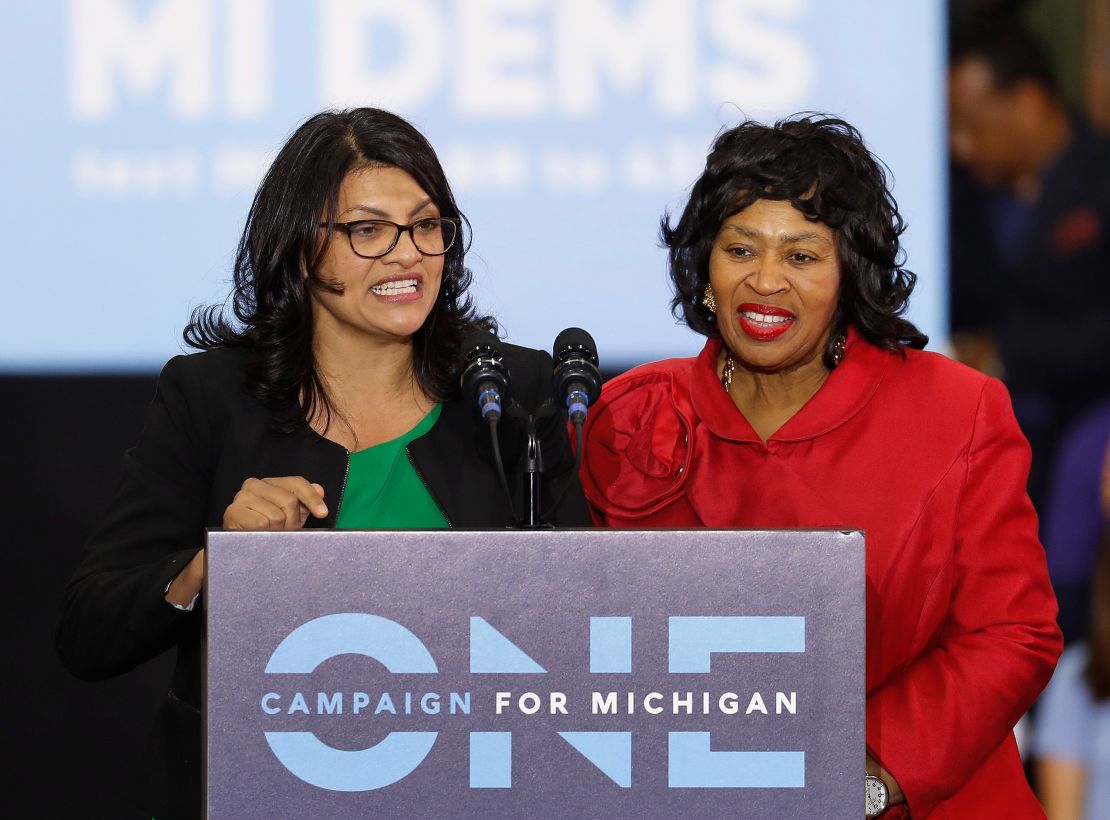A former television news anchor. A retired New York City police officer and high school civics teacher. An attorney who runs a mediation practice and serves as a volunteer minister.
These are just a few of the candidates – Democrats and Republicans – who have lined up to challenge three of the most high-profile freshman House Democrats: Alexandria Ocasio-Cortez, Ilhan Omar and Rashida Tlaib.
It’s not easy to unseat a sitting member of Congress, and the three members of the progressive “squad” have a number of built-in advantages as they run for reelection.
All three have unusually high name recognition for freshmen members of Congress and devoted national followings. They have the ability to raise significant amounts of money with Ocasio-Cortez and Omar ranking among the top fundraisers in Congress, according to the Center for Responsive Politics. And all three represent heavily Democratic, reliably blue congressional districts.
But they have become high-profile targets of criticism during their relatively short time in office so far.
All three have faced controversy over outside-the-mainstream political positions, frequently facing attacks from President Donald Trump and congressional Republicans. On a national level, Republicans have worked to turn their outspoken support for progressive politics into a liability for the Democratic Party.
At times, they also have frustrated or even been reubuked by members of their own party. Both Tlaib and Omar have faced criticism, including from Democrats, over statements related to Israel with House Speaker Nancy Pelosi and other members of House Democratic leadership once going so far as to publicly call on Omar to apologize for comments they said included “anti-Semitic tropes.”
“The fame and notoriety of these members can be a double-edged sword – it helps their fundraising, but also draws attention and competition,” said Kyle Kondik, an election analyst at the University of Virginia’s Center for Politics.
Kondik noted, however, that “incumbents hardly ever lose House primaries,” and the congresswomen don’t appear to have the kind of “obvious liabilities” seen in rare instances where a sitting House member ends up losing a primary such as in the recent case of Republican Rep. Steve King, who lost a primary after losing the support of House Republican leadership over racist comments.
Ocasio-Cortez told CNN in March that “it’s everyone’s right to enter the race” when asked about the field of challengers, but pointed out that “anyone who poses a challenge gets kind of automatically platformed by Republican and far-right publications and they can fundraise off of it.”
In New York’s 14th congressional district, Ocasio-Cortez will defend her seat in a Democratic primary on Tuesday where Michelle Caruso-Cabrera, a former longtime CNBC correspondent and anchor, has emerged as the most high-profile challenger.
In Michigan’s 13th congressional district, Tlaib is facing a re-match in an August 4 Democratic primary against Detroit City Council President Brenda Jones. Jones beat her once before to serve out the remainder of former congressman John Conyers’ term, but lost to Tlaib in the full-term election for the seat.
In Minnesota’s 5th congressional district, Omar is facing off against several Democrats, though none with a major national profile, in a primary on August 11. And Trump has been vocally supporting Lacy Johnson, one of the Republican candidates in the GOP primary for the seat.
Freshman Democratic Rep. Ayanna Pressley of Massachusetts is the only member of the “squad” who does not face a primary challenge.

Ocasio-Cortez defends focus on New York district amid attacks
There are major ideological differences between Ocasio-Cortez and Caruso-Cabrera.
The congresswoman is an outspoken advocate for progressive caucuses like the Green New Deal and Medicare-for-All. In contrast, Caruso-Cabrera describes herself as a centrist and a moderate. She has said “Medicare-for-All is not the answer” during her campaign and dismissed the Green New Deal as “divisive policy.”
Caruso-Cabrera has argued that Ocasio-Cortez is “M.I.A.” and cares more about building a national profile than her constituents. In an interview with CNN, she said the congresswoman “wants to be a national star,” adding, “I want to be a congresswoman for the people of the Bronx and Queens.”
Asked to respond to accusations she isn’t focused on her district, Ocasio-Cortez told CNN in March, “Really, it just makes the person sound tone deaf because if you think I’m not around, the person who’s not around is you, because you don’t see us and we’re everywhere. But if they want to go out and say things that are not true and run a Trump-ian style campaign, that’s on them.”
The congresswoman and her campaign have portrayed Caruso-Cabrera as a candidate backed by corporate interests and Trump allies, highlighting media reports that financial executives and pro-Trump donors have contributed to Caruso-Cabrera.
Ocasio-Cortez has also gone after her primary opponent for having once been a registered Republican and living in a Trump Tower apartment in Manhattan before moving to the district last year.
In response, Caruso-Cabrera has argued she is more committed to the district than the congresswoman and has said she is a true Democrat, while calling Ocasio-Cortez a Democratic socialist, a label the congresswoman has embraced.
“I am a real Democrat,” Caruso-Cabrera told CNN, adding that residents of the district “don’t want revolution.”
As she argues the congresswoman is absent from the district, Caruso-Cabrera has repeatedly attacked Ocasio-Cortez for staying in Washington for a week after the pandemic hit, despite Congress not being in session. Ocasio-Cortez has pushed back, saying she only did so because she felt unwell.
During a virtual debate in June, the congresswoman said she has hosted and attended more than 200 events in the district, including 17 town halls, and organized 235,000 constituent check-in calls and delivered more than 3,000 bags of groceries to constituents during the pandemic.
Caruso-Cabrera has so far raised more than $2 million, according to the latest data from the Federal Election Commission. It’s a significant amount of money, but just a drop in the bucket compared to Ocasio-Cortez’s fundraising, which stands at more than $10.5 million.
Anyone who runs against Ocasio-Cortez is guaranteed to share in the national spotlight given how well known the freshman Democrat has become.

“The congresswoman has a huge national persona, so if you’re in the race against her, you’re probably going to get some TV time,” said John Cummings, a retired New York city police officer and the only Republican candidate who qualified for the ballot in the district. As a result, he will face off against the winner of the Democratic primary in the November general election.
The district is heavily Democratic and considered to be a safe blue seat. But Cummings has still raised a substantial amount of money, bringing in more than $2.4 million so far.
Cummings, who now teaches high school civics in the Bronx, says he decided to get into the race after his students pushed him to get involved in politics. When he saw Ocasio-Cortez defeat veteran Democrat Joe Crowley in 2018, it gave him hope that maybe he could pull off an upset too.
“I think I have a lot more in common with the Joe Crowley voters, the Democrat voters, the more moderate voters, than Congresswoman Ocasio-Cortez does and if I can get out and mobilize that part of the voting base, I think I have a shot,” he said.

Tlaib faces a re-match in Michigan
Tlaib and Omar, who made history in 2018 as the first two Muslim women ever to serve in Congress, both face primary challengers of their own.
The most serious opponent Tlaib faces in Michigan is Detroit City council President Brenda Jones. In a 2018 special election after the resignation of former congressman John Conyers, Jones won out against Tlaib in a four-candidate Democratic primary and went on to win the seat for the remainder of the term.
Tlaib, however, narrowly won out against Jones in a six-candidate Democratic primary held at the same time to determine who would serve out the next full term for the congressional district. Jones lost by fewer than 1,000 votes in the race.
“I feel I have a really good chance of actually winning and returning back to my seat to represent the people of the 13th congressional district,” Jones told CNN in an interview. Jones describes herself as a centrist Democrat, saying “I don’t consider myself to be far to the left. I don’t consider myself far to the right.”
Jones held the seat for only five weeks, but prominently emphasizes her tenure on Capitol Hill with messages on her campaign website calling on voters to: “Return Brenda Jones to Congress.”
The latest available FEC data shows that Jones had raised roughly $37,000 as of March 3. According to her campaign, the total now stands at over $42,000. Tlaib has raised far more at a total of more than $2 million.
“Money helps in an election, but money doesn’t win an election,” Jones said, arguing that she has deep ties to the district and the community. “The people of the 13th congressional district know me, they know my work.”
Tlaib told CNN in April that her focus is on “protecting my constituents and my residents” during the coronavirus pandemic when asked for reaction to Jones getting into the race. The congresswoman added that her campaign had been working to deliver aid to the community in the midst of the crisis.
“People can say whatever they want, but I’m telling my supporters, donors, nationally and everywhere, you can support the work I’m doing by supporting front-line organizations that are providing for many of my neighbors that need the help the most right now,” Tlaib said.
Denzel McCampbell, a spokesperson for the campaign, told CNN in a statement that “During Rep. Tlaib’s first term, she has remained laser focused on delivering exceptional constituent services, while advocating for bold, transformative legislation that will provide equity, justice, and opportunity to everyone in her district.”
“During the pandemic, Rep. Tlaib has helped residents obtain PPE and access needed unemployment benefits, and has raised tens of thousands of dollars for local service organizations,” McCampbell said, adding that “Rep. Tlaib is rooted in the community and has not stopped working for residents.”
Trump endorsement brings in money for GOP challenger to Omar
In Minnesota, Antone Melton-Meaux, an attorney who runs a mediation practice, is one of the candidates running in a Democratic primary against Omar. In an interview, he said of the congresswoman, “A lot of her views are radical and I think they’re out of line and out of touch with this district.”
Melton-Meaux, a first-time candidate for elected office who has raised more than $480,000, said that campaigning during a pandemic, where traditional get out the vote efforts are not possible, has been a challenge, but that his campaign has “engaged with residents on issues that matter most to them, like their health and personal safety in the wake of George Floyd’s murder.”
Omar, meanwhile, has raised more than $3.3 million to support her reelection bid. In 2018, Omar received more votes in total than any new member of Congress and outperformed 428 congressional districts out of 435, according to an analysis from the congresswoman’s campaign team.
Omar announced earlier this week that she lost her father during the pandemic after he died from coronavirus complications.
Then there are Republican challengers, who represent even more of a long-shot in blue districts, but have nevertheless generated attention and, in some cases, raised significant amounts of money.
Trump endorsed Lacy Johnson, a GOP challenger to Omar, in May. The presidential endorsement put a national spotlight on Johnson, who has raised more than $1.1 million in his race. Anton Lazzaro, a spokesman for the campaign, told CNN that the President’s endorsement generated a big bump in fundraising as did Trump’s tweet in June saying that Minnesota needs Johnson “NOW.”
In an interview with CNN in February, Johnson acknowledged the uphill battle he faces in the heavily Democratic district.
“I do have a realistic chance, but let’s be honest it’s the same type of realistic chance I would have of climbing Mount Everest or stringing a tightrope between the two World Trade Center towers and walking between those. I don’t kid myself about the difficulty of the task that lies before me,” Johnson said, but added, ” the fact that it’s difficult and hard, I welcome that.”
Some Republican candidates hope their campaigns will boost Republican voter turnout in battleground states during the November general election when President Trump will be on the ballot working to win a second term in office.
In Michigan, a state that had been a part of the Democratic Party’s “blue wall” in the Midwest, but went for Trump in 2016, Republican Al Lemmo, is hoping that will be the case if he makes it to the general election against Tlaib.
“This is going to be a serious effort to win the district and hopefully take some other Republican candidates across the finish line as well,” Lemmo, who has raised close to $490,000 according the latest FEC data, told CNN, citing both President Trump and John James, a Republican Senate candidate vying to take on Michigan Democratic Senator Gary Peters in the fall.
“I expect to play a big part in bringing the President across the finish line in the state of Michigan,” Lemmo said.























